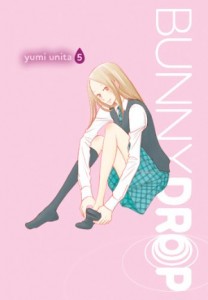By Yumi Unita. Released in Japan as “Usagi Drop” by Shodensha, serialized in the magazine Feel Young. Released in North America by Yen Press.
Please do not discuss Bunny Drop in the comments beyond Volume 7.
Everyone thinks a lot in Bunny Drop. I don’t just mean that we see their thoughts in addition to their dialogue, which we do, but that they think deeply all the time. Weighing decisions – and then wondering if they’re the correct ones – is something that Daikichi and Rin have done since this series began, and now that Rin is getting near graduating from school, she’s starting to think about her future. Which will involve having to resolve her past, and that means that she is finally going to have to meet Masako.
Yumi Unita knows that the best way to write a lovable, heartwarming manga is to make sure everything is as awkward as possible, so I was relieved to see that when Rin and Masako finally do meet, it wasn’t all hugs and tears and resolve to see each other every 2nd Saturday from now on. Rin still barely remembers Masako, even now – though we find out a reason for that here – and Masako may be moving on with her life and trying to be a better person, but she still acts like she regards Rin as a failed time in her life that makes her think lots of things she doesn’t want to. Masako’s childish qualities haven’t gone away, and it’s still very hard to sympathize with her. But we’re meant to be on Rin’s side here anyway.
Rin does a lot of soul searching here, spurred on partly by what happened with Kouki in Vol. 6 and partly through hearing about Reina getting a boyfriend (and then later watching it fall apart). She’s spent her last ten years growing up in an unconventional family, and realizes that she has a rather small pool of friends as well, mostly as she’s not doing clubs or sports, but going home to take care of Daikichi. I don’t think this is meant to be a dig on Daikichi himself – the general sense is that Rin really wants to do these things, and is likely better at cooking, etc., so has just stepped into this role at home.
Daikichi, meanwhile, is also growing older, and is having to deal with a serious injury for the first time – he puts his back out catching Rin when she falls off a stool. Given that he works in the shipping industry, this could be a big problem if it lingers. I was amused to see his co-workers coming over and reminiscing about their own back pains of the past, as well as Kouki’s mother telling Rin she had a back injury when she was in her twenties. But all this does is remind us how insular Daikichi’s own life has become as well. He doesn’t really hang out with co-workers anymore – his closest friend, in fact, may be Kouki.
So Rin is wondering about what it means to be a mother, and what it means to be a daughter. And realizing that the time may come when her life takes her away from Daikichi. And, unsurprisingly given how she’s grown up, she is not particularly fond of that day coming at all. That said, it’s not clear that day is coming soon in the manga either. The romantic drama we saw in Vol. 6 gets a brief mention here, but for the most part still appears to be over. So where does Rin go from here? Stay tuned for Vol. 8, coming out in April. Which may have a certain elephant that’s been lurking around the room. In the meantime, Vol. 7 gives us more of what we like about this series – thoughtful moments in the life of a kid who’s far too smart (but naive) for her own good.



